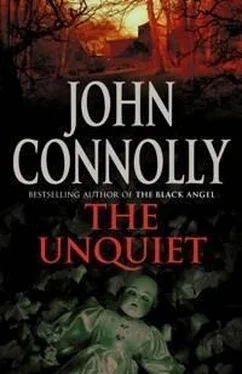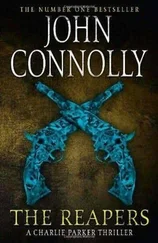Merrick called me at midday. I’d been checking for signs of him all morning, but I didn’t see him or his red car. If he was smart, he’d have changed the car, but that assumed that Eldritch and his client were still prepared to bankroll him. I’d taken all of the precautions I could in case Merrick, or someone else, was keeping an eye on my movements. I was satisfied that no one was, not that day. In addition, Jackie Garner confirmed that all was still quiet where Rebecca Clay was concerned. But Merrick was on the phone, threatening to shatter that silence.
“Time’s up,” he said.
“You ever consider that you might get further with honey than vinegar?”
“Feed a man honey, and you get his love. Feed him vinegar, and you get his attention. Helps if you grab him by the balls too, and squeeze him some.”
“That’s very profound. You learn that in jail?”
“Hope you didn’t waste all that time finding out about me, else we’re going to have us a problem.”
“I didn’t come up with much, not on you and not on Daniel Clay either. His daughter doesn’t know any more than you do, but then she told you that already. You just didn’t want to listen.”
Merrick forced air through his nose in an imitation of amusement.
“Well, that’s unfortunate. You tell missy I’m disappointed in her. Better yet, I’ll tell her myself.”
“Wait. I didn’t say that I’d found nothing.” I needed leverage, something to draw him in. “I have a copy of the police file on Daniel Clay,” I lied.
“So?”
“It mentions your daughter.”
Now Merrick was silent.
“There’s some material in it that I don’t understand. I don’t think the cops did either.”
“What is it?” His voice sounded husky, as though something had suddenly caught in his throat.
I should have felt bad about lying. I was playing on Merrick ’s feelings for his missing child. There would be consequences when he found out the truth.
“Uh-uh,” I said. “Not over the phone.”
“So what do you suggest?” he asked.
“We meet. I give you a look at the file. I’ll tell you what I’ve learned. Then you go and do what you have to do, as long as it doesn’t involve Rebecca Clay.”
“I don’t trust you. I seen those cavemen you got guarding the woman. What’s to stop you from trying to turn them loose on me? I got no problem killing them if it comes down to it, but it would kind of hinder my investigations, you might say.”
“I don’t want their blood on my hands either. We meet in a public place, you read the file, and we go our separate ways. I’m warning you, though: I’m giving you a break because of your daughter. You show up again around Rebecca Clay, and this is all going to step up a notch. I guarantee that you won’t like what happens then.”
Merrick gave a theatrical sigh. “Now that you got the pissing competition out of the way, maybe you’d like to name a place.”
I told him to meet me at the Big 20 Bowling Center on Route 1. I even gave him directions. Then I started making my calls.
Tween got back to me at three o’clock that afternoon.
“I’ve found someone for you. He comes at a price.”
“Which is?”
“A ticket to tonight’s hockey game, and fifty bucks. He’ll meet you there.”
“Done.”
“Just leave his ticket for collection with my name on the envelope. I’ll take care of the rest.”
“How much do I owe you?”
“Hundred dollars sound fair?”
“It sounds fine.”
“I got some change for you too. I’ll give it to you when you pay me.”
“Has he got a name, this guy?”
“He has, but you can call him Bill.”
“Is he the nervous type?”
“He wasn’t until I mentioned Frank Merrick. I’ll see you around.”
Candlepin bowling is a New England tradition. The balls are smaller and lighter than in tenpin, and the pins are thinner: three inches in the middle and one and a half at the top and bottom. Getting a strike is more a matter of luck than skill, and it’s said that nobody has ever bowled a perfect ten-strike candlepin game. The best score recorded in Maine is 231 out of a possible 300. I’d never bowled over 100.
The Big 20 in Scarborough had been in existence since 1950, when Mike Anton, an Albanian by birth, founded it as Maine ’s largest and most modern bowling house, and it didn’t seem to have changed much since then. I sat on a pink plastic chair, sipped a soda, and waited. It was four-thirty on a Friday afternoon, and every lane was already in use, the ages of the players ranging from teenagers to seniors. There was laughter and the smell of beer and fried food and the distinctive sound of the balls rolling along the wooden alleys. I watched two old guys who barely spoke ten words to each other close in on 200 each, and when they failed to break the double century one of them expressed his disappointment in a single “Ayuh.” I sat in silence, the only lone male among groups of men and women, knowing that I was about to cross a line with Merrick.
My cell phone rang shortly before five, and a voice said, “We got him.”
Outside there were two Scarborough police cruisers and a trio of unmarked cars, one each from the Portland P.D., the South Portland P.D., and the Scarborough cops. A handful of people had gathered to watch the show. Merrick was facedown in the parking lot, his hands cuffed behind his back. He looked up at me as I approached. He didn’t appear angry. He just seemed disappointed. I saw O’Rourke nearby, leaning against a car. I nodded to him and made a call. Rebecca Clay answered. She was at the courthouse, and the judge was about to issue the temporary protection order against Merrick. I told her that we had him and that I’d be at Scarborough P.D. headquarters if she needed to contact me when she was done.
“Any problems?” I asked O’Rourke.
He shook his head.
“He walked right into it. Didn’t even open his mouth to ask what was going on.”
As we watched, Merrick was hauled to his feet and put in the back of one of the unmarked cars. He stared straight ahead as it pulled out.
“He looks old,” said O’Rourke. “He’s got something, though. I wouldn’t like to cross him. And I hate to tell you this, but I think you just have.”
“It didn’t seem like I had a whole lot of choice.”
“Well, at least we can hold him for a while and see what we get out of him.”
The length of time for which Merrick could be held would depend on the charges brought against him, if any. Stalking, defined as engaging in conduct that would cause a person to suffer intimidation, annoyance, or alarm, or to fear bodily injury, either to that person or a member of that person’s immediate family, was defined as a Class D crime. Similarly, terrorizing was a Class D, and harassment was a Class E. There was always the possibility of adding trespassing and criminal damage to the list, but taken altogether it meant that Merrick could be held only until the following Tuesday evening, assuming he didn’t get lawyered up, since D and E offenses allowed a suspect to be held for only forty-eight hours without charge, excluding weekends and holidays.
“You think your client will want to take this all the way?” asked O’Rourke.
“Do you want her to?”
“He’s a dangerous man. Seems kind of rude to lock him up for just sixty days, which is what he’ll get if the judge buys all the arguments in favor of putting him away. Might even be counterproductive, although if anyone asks, I didn’t say that.”
“You never struck me as the gambling type, you know that?”
“It’s not a gamble. It’s a calculated risk.”
“Based on what?”
“Based on Frankie’s reluctance to be jailed and your ability to protect your client.”
Читать дальше












